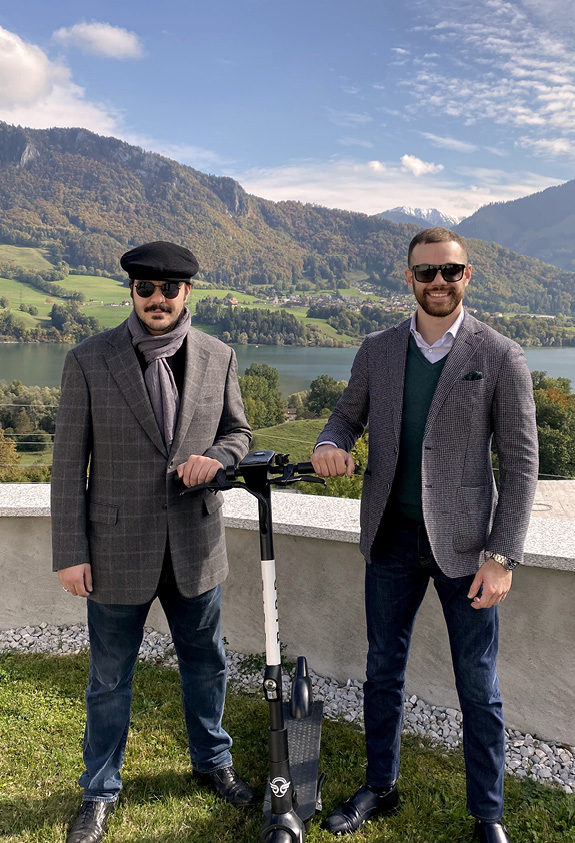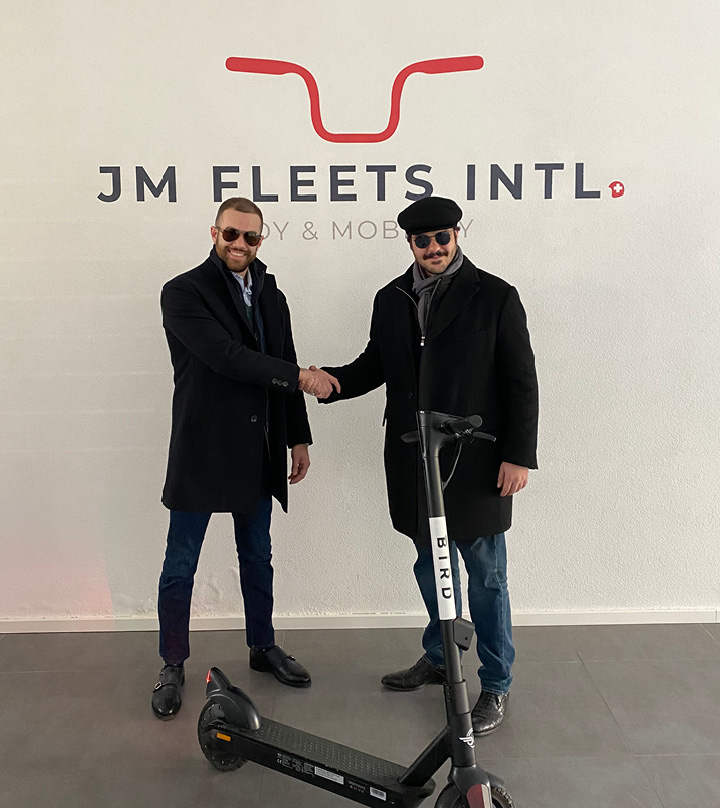


Electric scooter sharing is being trialed in the Swiss municipality of Bulle, home to our largest campus. And the Glion connection doesn’t end there, as we discovered…
They’re an urban phenomenon that first appeared in Santa Monica, USA, just three years ago; it’s estimated there will be 4.6 million in use by 2024; and their high profile backers include Olympic legend Usain Bolt and tech royalty Uber, among others.
Now – thanks to a graduate and a current student of Glion – they’ve come to Bulle. ‘They’ being shared electric scooters (e-scooters), seen by many transport experts as the final piece in the urban mobility jigsaw.
The project is the brainchild of Glion alumnus Josef Komives and final year Bachelor student Michael Ayache. Josef and Michael have teamed up to form a new company, JM Fleets International Sàrl, to run the pilot scheme for the city, having won a 3-year exclusive permit for Bulle and its surrounding region.
“Studying at Glion has helped to forge our business ‘personality’ – we are able to analyze the market and the competition to identify opportunities such as this,” says Josef, who graduated in February of this year. “We can see that Bulle has huge potential for everything.”
JM Fleets has deployed a fleet of 60 scooters from one of the industry’s leading players, Bird, with whom they are an official carrier (partner).
“This is a ‘last mile’ service to the community,” explains Josef. “Several local users already depend on our scooters throughout the day, in order to move from A to B. Our team has observed that a number of riders are quite repetitive on a daily and hourly basis.”
Such usage is key to delivering so-called ‘intermodal’ urban transport; an area in which Switzerland is taking an international lead. Under this system, a commuter may use a vehicle to reach their local station, a train for the main element of their commute, and then a bus, metro or taxi to reach their office, assuming it’s too far to walk. Adding rental bicycles or e-scooters to the mix either side of the main commute can make the ‘first mile/last mile’ more efficient and environmentally friendly, thus completing the intermodal circle.

“Studying at Glion has helped to forge our business ‘personality’ – we are able to analyze the market and the competition to identify opportunities such as this”
Josef Komives
How the JM Fleets service works
JM Fleets’ 60 e-scooters are operational from 06:00 each day. At night, they are retrieved for sanitizing, servicing and battery charging, to ensure their reliability and thus build customer loyalty. The scooters have dedicated stations (avoiding the disorderly ‘sidewalk clutter’ seen in cities like Paris) and any that are left in far-off locations are retrieved by a special task force which is on duty seven days a week.
“This is naturally a heavy overhead, alongside our franchise fee; but as the business grows we will be able to reduce costs through economies of scale,” says Josef.
Scooters for business – and pleasure
E-scooters are not just a practical solution to make commuters’ lives easier. “Our other big local users are what we call the ‘joy riders’, a segment that rides for pure enjoyment at any time of day, including at night and early morning. Sometimes these rides can last 80 minutes straight!” Michael adds.
Why Bulle? Apart from the obvious campus connection, the city is an interesting test-bed for urban mobility, being much smaller than many (such as Paris) which have trialed these services. The foresight and ambition shown by the city council through its willingness to trial a sharing service like this – the first to do so in the French-speaking part of Switzerland – has also been crucial.
“After the four-month trial period, if the balance of experience is positive, we expect to formalize a long-term agreement between JM Fleets and the city,” notes Michael.
- With special thanks to Glion faculty member Claudio Zucco for his help in creating this feature

















